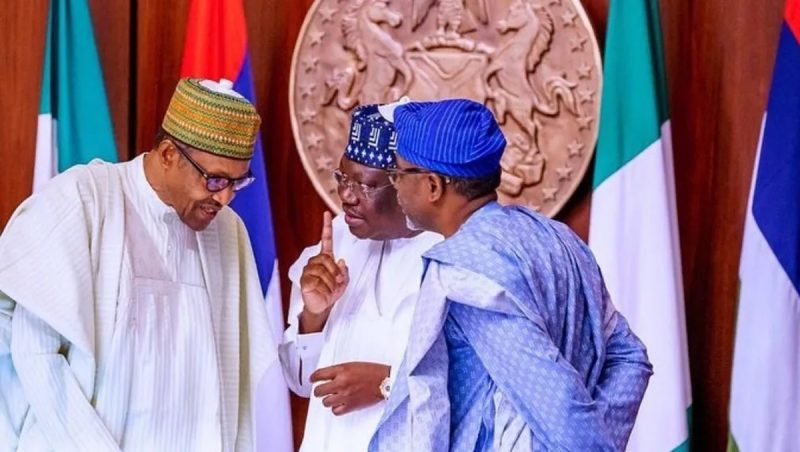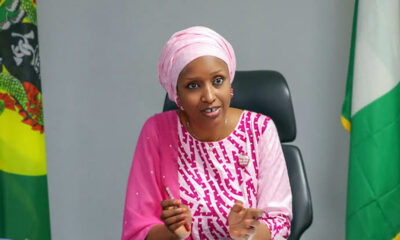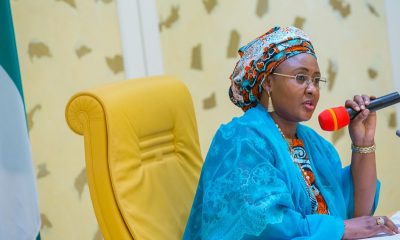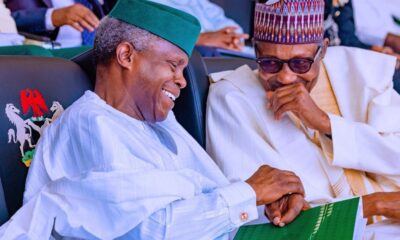News
Electoral Bill: Buhari snubs N/Assembly, declines assent

Members of the National Assembly last night expressed reservations as President Muhammadu Buhari refused to act on the Electoral Act Amendment Bill presented to him for assent by the legislature, 30 days ago.
The 30-day window for President Buhari to assent the bill elapsed last night. As of the time of filing this story, there was no official communication to the parliament and Nigerians from the presidency on the fate of the much-anticipated bill.
Both the Senate President Ahmad Lawan and Speaker of the House of Representatives Femi Gbajabiamila, had at different times met with President Buhari over the bill and expressed confidence that he would assent to it.
Some of the lawmakers knocked the president, who returned to the country from Istanbul, Turkey, where he attended the third Turkey-Africa Partnership Summit, hosted by the Turkish President, Recep Tayyip Erdogan.
The National Assembly had, on November 19, transmitted the bill to President Buhari for assent in line with the constitutional provision.
Section 58 (4) of the 1999 Constitution says, “Where a bill is presented to the President for assent, he shall within 30 days thereof signify that he assents or that he withholds assent.”
READ ALSO:
- Hushpuppi: IG submits report on Abba Kyari to Police Service Commission
- Late Edo youth wandered into military checkpoint naked, mother picked him up alive – Army
- Couple sells one-month-old baby for N50,000
While the political and civil society actors waited with bated breath for the president’s action on the bill, it emerged last week that the Attorney-General of the Federation (AGF) and Minister of Justice, Abubakar Malami (SAN), had written a letter to Buhari, highlighting the problems with the inclusion of mandatory direct primaries in the Electoral Act amendment bill.
He informed the president that making direct primaries mandatory for all political parties could cause confusion.
A source told Daily Trust yesterday that the president will communicate to the leadership of the parliament today, where he is expected to raise reservation with clause 87, which provides for direct primary.
There has been a cold war between federal lawmakers and governors over the inclusion of direct primaries in the bill, with the latter mounting pressure on the president to reject the provision.
Various Civil Society Organisations (CSOs) yesterday asked the parliament to override the president’s veto to pass the bill into law.
Recalled that in June 2000, the National Assembly passed the Niger Delta Development Commission (NDDC) bill with over two-thirds majority, thus overriding President Olusegun Obasanjo’s veto.
A cross section of senators told Daily Trust yesterday that before they embark on the end of the year recess this week, a decision would be taken on the electoral bill should the president withhold assent.
A Senator close to the presiding officers, said they are yet to receive any communication from the president regarding the bill.
Speaking to one of our correspondents, the lawmaker said action would be taken when the president communicates his decision on the bill to them.
READ ALSO:
- 11 arrested for killing cop, kidnapping customs officer
- Death toll rises to 38 in bandits’ attacks on Kaduna villages
- Why Army detained female soldier who accepted corps member’s proposal in Kwara – Spokesman
“For sometimes, there have been pressure that we should invoke the 2/3 rule as enshrined in the 1999 Constitution if the president fails to assent it. Discussions are on along this line but there are a lot of things that would be looked at before we can arrive at anything,” he said.
Another ranking lawmaker said the president was being misled by his handlers to cause confusion in the polity.
“He would not assent to it because he is being misled by people around him and he likes to hear that. They are doing this to cause confusion in the polity. It would be difficult for us to override the president’s veto because we cannot get the 2/3,” he said last night.
But Senator Kabiru Gaya (APC, Kano), expressed optimism that the president will act on the bill.
Another senator who spoke to one of our correspondents said, “We passed the bill to strengthen the country’s democratic process, especially the conduct of our elections. From reactions that trailed the passage, it shows that majority of Nigerians are in support of the bill.
“Certain people, very few in number, who are not comfortable with some sections of the bill are expressing reservations. We, in the National Assembly, will continue to act in the interest of the majority of Nigerians, who we represent. Our action on the electoral bill will not be different. Nigerians should wait patiently.”
Another senator, referring to state governors, said “They tried to lobby us to rescind our decision on direct primary but failed. They now transferred the pressure on the president to reject the bill.”
He said if the process of conducting primary elections is optional, elective offices would be populated with incompetent cronies.
Senate spokesperson, Senator Ajibola Basiru declined to comment on possible options the Red Chamber is weighing on the electoral bill after the expiration of the 30-day timeline.
Asked further on what Nigerians should expect from the Senate should Buhari decline assent, he said; “I don’t have any comment on it,” and hung off.
Rep Tanko Sununu (APC, Kebbi) while responding to questions on the matter said it was too early for him to make comments since the president was yet to communicate to House on whether he has assented or declined assent.
“For me, I won’t say the president has turned down assent or has assented because, there are formal channels of communication of which by Tuesday’s sitting, we should be able to know whether the president has assented or not.
“And that will definitely guide the decision the House will take. I don’t want to preempt what the president has done or has not done. Had it been he has not assented to and it is made public, then I can comment”, he said.
Speaking in the same vein, a lawmaker from the South South geopolitical zone, said it would be preemptive to begin to comment on the next move of the lawmakers since it has not been ascertained that the president has withheld his assent.
Rep Babangida Ibrahim (APC, Katsina), said, “The President must communicate whether he assented to the bill or not. You know Saturdays and Sundays are not working days. So, you cannot say whether he has rejected it or not.”
Presidential aides on National Assembly, Senator Babajide Omoworare (Senate) and Umar Ibrahim El-Yakub were unavailable for comments last night.
READ ALSO:
Niger LG shuts schools as bandits threaten attacks
Override president, CSOs urge lawmakers
The Executive Director, Civil Society Legislative Advocacy Centre (CISLAC), and also Coordinator, Transparency International (TI) in Nigeria, Auwal Musa Rafsanjani, said the National Assembly members, as the representatives of Nigerians, have done well in passing the majority wish of the citizens to the president.
He said that it is left for the lawmakers to prove to Nigerians that they are not rubber stamp, as claimed by Senate President Ahmad Lawan, by overriding President Muhammadu Buhari’s veto.
“The president’s interest should not override Nigerians’ and national interest. It is disheartening that the president who lamented that he was a victim of political corruption before emerging president, has not sent any bill to the National Assembly to deepen democracy and is not keen on acting in the interest of tackling political corruption by signing the Electoral Amendment bill sent to him the National Assembly,” he said.
Also speaking, the Convener, Good Governance Team (GGT), Mr. Tunde Salman, urged the National Assembly to override the presidential veto at least to pass a strong message that the current Assembly is not a rubber stamp legislature as widely believed.
“I am not comfortable that the Attorney General of the Federation (AGF) would now be serving as a clearing house for bills passed by the National Assembly. Where was his office, when the amendments procedures were being considered, to make his inputs?” Salman said.
On her part, the Director of the Centre for Democracy and Development (CDD), Idayat Hassan, noted that President Buhari has a penchant for rejecting electoral bills.
She said between 2017 and 2018, the president declined the bills four times giving reasons ranging from controversial clauses to time frame under the ECOWAS’s supplementary protocol as his reasons.
Hassan said, “This fifth rejection will be one too many. The president was a beneficiary of an improved electoral landscape including law and election management body. So, he must bequeath the same as legacies to Nigeria. A refusal to sign the electoral bill because of direct primaries will militate against forward-looking provisions such as the electronic transmission of results.
“What exactly is bad in doing direct primaries if it will open up the political space for women, youth and other historically marginalised categories? We can only hope that the lawmakers can show they are true representatives of the people, not their political parties and go ahead to veto. The 312 votes needed should be a walkover but it may be a pipe dream for us as citizens.”
On their part, a coalition of CSOs said that the president’s delay in signing the bill has created unpalatable suspense and generated avoidable apprehension, although his inaction may not be the final call after December 19.
This was contained in a joint statement by Ariyo-Dare Atoye, Executive Director, Adopt A Goal Initiative; Jude Feranmi, Convener, Raising New Voices Initiative; Maryam Ahmed, Programme Officer, Center For Liberty; Kenneth Eze, Convener, Speak Out Africa Initiative; Simi Olusola, Executive Director, The Nigerian Alliance; and Obinna Eze Nwagbara, Executive Director, Youth and Students Advocates for Development Initiative (YSAD).
They said, “This will not be the first time in the last 20 years that the National Assembly will override the president; the 4th legislative session did so and got the NDDC Act passed and operational. The 9th National Assembly has the opportunity of not sharing with the executive the glory that will accompany the new act.”
Daily Trust
News
Teargas, Chaos at EFCC as El-Rufai’s Supporters Clash with Security Operatives

Teargas, Chaos at EFCC as El-Rufai’s Supporters Clash with Security Operatives
Tension gripped Abuja on Monday as security operatives fired teargas to disperse protesters and supporters of former Kaduna State Governor, Nasir El-Rufai, during a confrontation at the headquarters of the Economic and Financial Crimes Commission (EFCC).
The standoff reportedly occurred when hundreds of El-Rufai’s supporters accompanied him to the anti-graft agency’s headquarters, escalating an already charged political atmosphere in the Federal Capital Territory.
Eyewitness accounts and video footage circulating online showed security personnel deploying teargas canisters as crowds surged toward the EFCC complex.
In one of the videos, agitated voices were heard declaring, “We will come back; when it clears, we will come back,” suggesting the group’s resolve to sustain their protest despite the crackdown.
READ ALSO:
- NSCIA Secretary-General Clarifies Council Receives No Government Funding
- Saudi Supreme Court Calls on Muslims to Sight Ramadan Crescent Moon on Tuesday Evening
- Nigeria Tax Act 2025: FG Clarifies No New Construction or Bank Taxes
The development follows reports last Thursday that El-Rufai was allegedly stopped by security operatives at the Nnamdi Azikiwe International Airport, Abuja, in what his supporters described as an attempted arrest.
While official details surrounding the airport incident remain unclear, the situation appeared to have heightened tensions among his loyalists.
El-Rufai, who served as governor of Kaduna State from 2015 to 2023, remains a prominent political figure and a key voice within Nigeria’s political landscape.
His tenure was marked by sweeping reforms as well as controversy over security challenges and policy decisions in the state.
As of press time, the EFCC had yet to issue an official statement clarifying the circumstances surrounding Monday’s confrontation or addressing reports of any investigation involving the former governor.
Security presence around the commission’s headquarters was significantly reinforced following the clash, with access to parts of the area temporarily restricted.
The incident adds to growing political tensions in the country, particularly as anti-corruption investigations continue to intersect with high-profile political actors.
Teargas, Chaos at EFCC as El-Rufai’s Supporters Clash with Security Operatives
News
NSCIA Secretary-General Clarifies Council Receives No Government Funding

NSCIA Secretary-General Clarifies Council Receives No Government Funding
The Secretary-General of the Nigerian Supreme Council for Islamic Affairs (NSCIA), Prof. Is-haq Oloyede, has clarified that the council has never received financial support from any government, either within or outside Nigeria. Speaking in Lagos at the 31st Annual Pre-Ramadan Lecture of the University of Lagos Muslim Alumni (UMA), Oloyede stressed that the NSCIA operates independently and relies largely on modest private donations to sustain its activities.
Oloyede, who also serves as Registrar of the Joint Admissions and Matriculation Board (JAMB), explained that in his 15-year tenure as NSCIA Secretary-General, the council had not received “a kobo” from any government. He added that fewer than 20 individuals have donated amounts up to ₦500,000 since 2013, highlighting that the council functions without significant external funding. He decried misinformation and divisive narratives suggesting government involvement under the leadership of the Sultan of Sokoto, Muhammad Saad Abubakar, noting that such speculation undermines unity within Nigeria’s Muslim community.
READ ALSO:
- Saudi Supreme Court Calls on Muslims to Sight Ramadan Crescent Moon on Tuesday Evening
- Nigeria Tax Act 2025: FG Clarifies No New Construction or Bank Taxes
- Israeli Airstrikes Kill 12 in Gaza as Violence Persists Despite Ceasefire
Speaking on the theme “Muslims: The Challenge of National Security,” Oloyede warned against viewing insecurity, terrorism, and banditry through a religious lens. He said extremists often cloak their violent acts in religious language, but such actions do not reflect Islam. “Islam cannot be determined by what extremists say or do. We have a duty to correct that narrative,” he said, urging Muslims to reject all forms of extremism while understanding that insurgency thrives on enabling political, social, and economic conditions.
Oloyede stressed that security is central to Sharia, emphasizing that a true Muslim is someone “from whose actions neighbours — regardless of their faith — are safe and secure.” He cautioned against reducing insecurity to regional or religious differences, noting that all parts of Nigeria face security challenges. He called on Muslims to embrace moral responsibility, civic accountability, and practical partnerships to improve national security.
Other speakers at the lecture also highlighted the societal dimensions of insecurity. Dr. Ridwan Jamiu, Chief Imam of Lekki Central Mosque, described insurgents as agents of evil and stressed the need for religious leaders to promote peace and guide followers toward positive community engagement. Lagos State Assembly Speaker Mudashiru Obasa identified poverty and economic inequality as key drivers of insecurity and urged the government and policymakers to focus on job creation, education, and inclusive development as long-term solutions.
The lecture, part of the annual pre-Ramadan engagements, comes at a time when Nigeria continues to grapple with complex security challenges, including insurgency in the Northeast, banditry in the Northwest and North-Central, and rising violent crime in the South. Experts emphasize that national cohesion, interfaith cooperation, and community-led security initiatives are vital to tackling these threats effectively.
NSCIA Secretary-General Clarifies Council Receives No Government Funding
News
Saudi Supreme Court Calls on Muslims to Sight Ramadan Crescent Moon on Tuesday Evening

Saudi Supreme Court Calls on Muslims to Sight Ramadan Crescent Moon on Tuesday Evening
The Supreme Court of Saudi Arabia has urged Muslims across the Kingdom to look for the Ramadan crescent moon on the evening of Tuesday, February 17, 2026, to determine the official start of Ramadan 1447 AH. The court emphasized that community participation in moon sighting is vital for confirming the beginning of the holy month.
In an official statement relayed by the Saudi Press Agency, the Supreme Court instructed anyone who spots the new moon crescent — either with the naked eye or using binoculars — to report their observation to the nearest court and ensure their testimony is recorded. Local centres have also been set up to assist observers in reaching judicial offices.
The Kingdom has established moon sighting committees across regions to coordinate observations and support public involvement. Authorities encouraged citizens to actively participate, noting that their contributions are essential to help Muslims across Saudi Arabia begin Ramadan in unity.
READ ALSO:
- Nigeria Tax Act 2025: FG Clarifies No New Construction or Bank Taxes
- Israeli Airstrikes Kill 12 in Gaza as Violence Persists Despite Ceasefire
- FBI Probe Continues as Ex‑Church Minister Who Confessed to Child Abuse Remains Free
Tuesday corresponds to 29 Sha’ban 1447 AH in the Islamic lunar calendar. If the crescent moon is sighted, Ramadan 1447 AH will commence on Wednesday, February 18, 2026. If the moon is not visible, Sha’ban will be completed as 30 days, and Ramadan will begin on Thursday, February 19, 2026. This aligns with centuries-old Islamic tradition of lunar observation.
Muslims worldwide, including in the Gulf Cooperation Council (GCC) countries, are preparing for Ramadan, a sacred month of fasting, prayer, reflection, and charity. Astronomical forecasts suggest visibility may vary across regions, making local observations and testimonies crucial. Similar calls for crescent moon sightings have also been issued by authorities in countries such as Qatar and the United Arab Emirates.
The Supreme Court’s announcement underscores the importance of lunar observation in Islamic practice and encourages public engagement to ensure a synchronized start of Ramadan across the Kingdom.
Saudi Supreme Court Calls on Muslims to Sight Ramadan Crescent Moon on Tuesday Evening
-

 Education2 days ago
Education2 days agoCheck Your Name: UNILORIN Releases Updated NELFUND Refund List for 2024/2025 Students
-

 News1 day ago
News1 day agoOsogbo Sons and Daughters Mark 5th Anniversary with Awards, Political Undertones
-

 metro2 days ago
metro2 days agoWoman Arrested Over Murder of Nigerian E-Hailing Driver in South Africa
-

 News2 days ago
News2 days agoAfenifere Calls for Immediate Take-Off of State Police as Terror Threats Rise in Yorubaland
-

 metro2 days ago
metro2 days agoBoko Haram Terrorists Release Video of 176 Abducted Kwara Residents
-

 metro13 hours ago
metro13 hours agoUS Freezes Assets of Eight Nigerians Over Boko Haram, ISIL, Cybercrime Links
-

 metro2 days ago
metro2 days agoUS Military Boosts Support for Nigeria’s Fight Against Insurgency With Ammunition, Troop
-

 metro14 hours ago
metro14 hours agoTerror in Lagos Traffic: Cutlass Gang Unleashes Mayhem on Mile 12–Ketu Road















